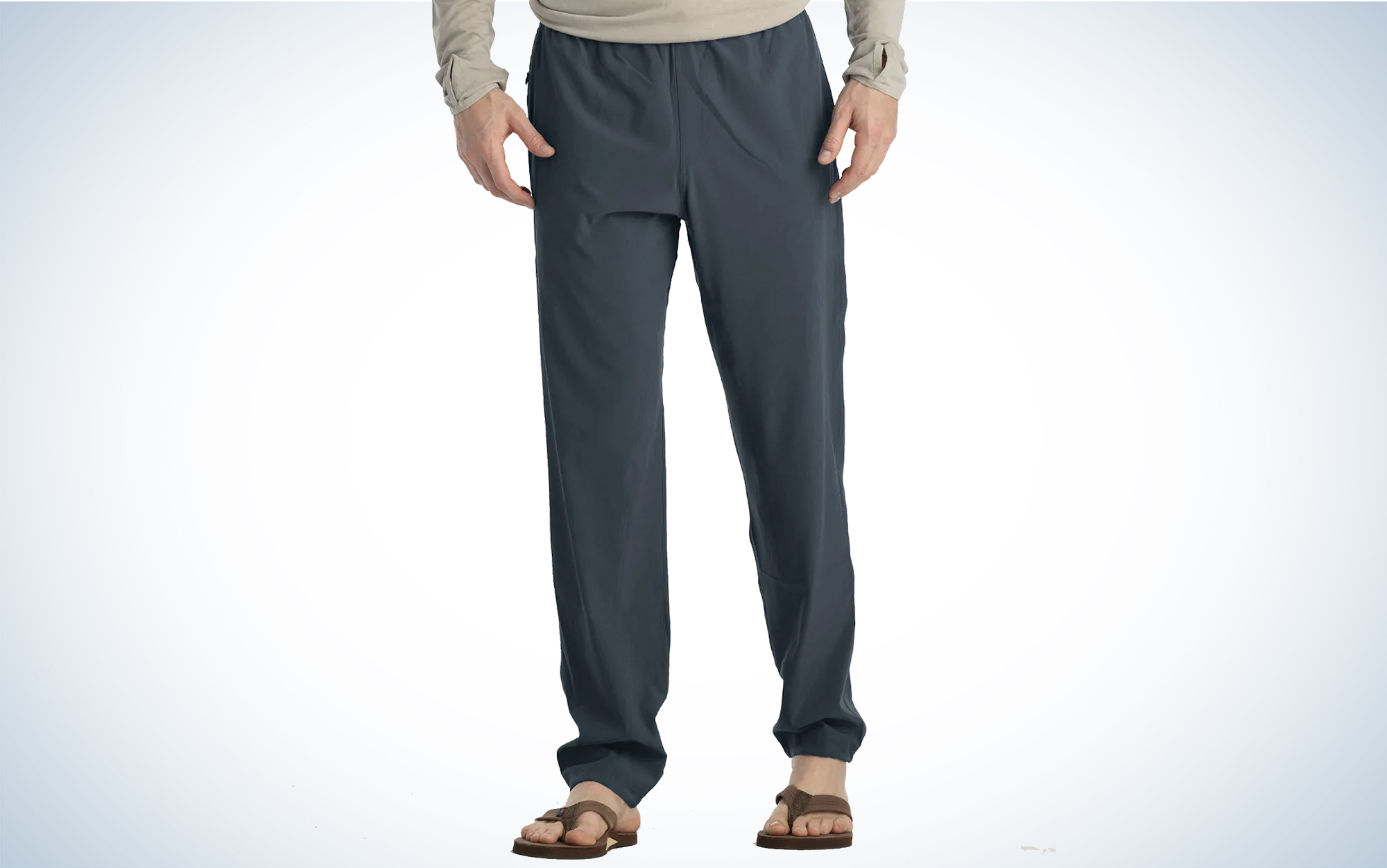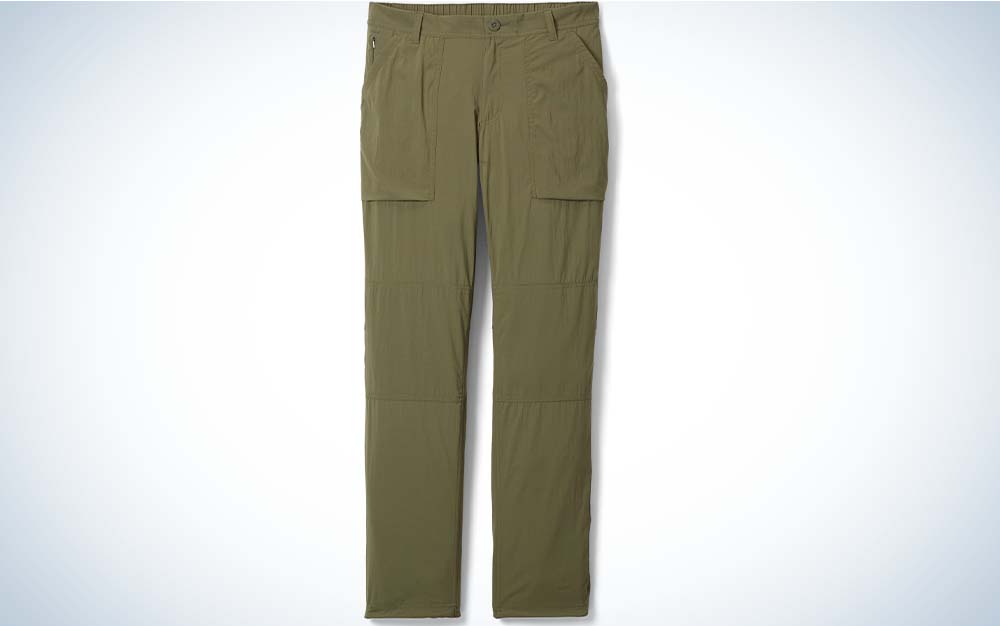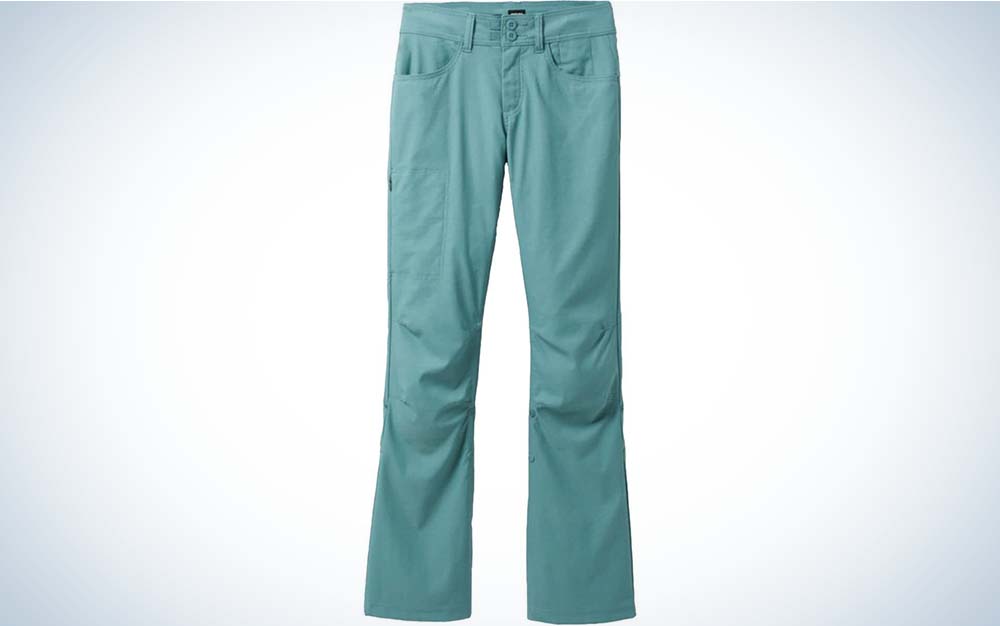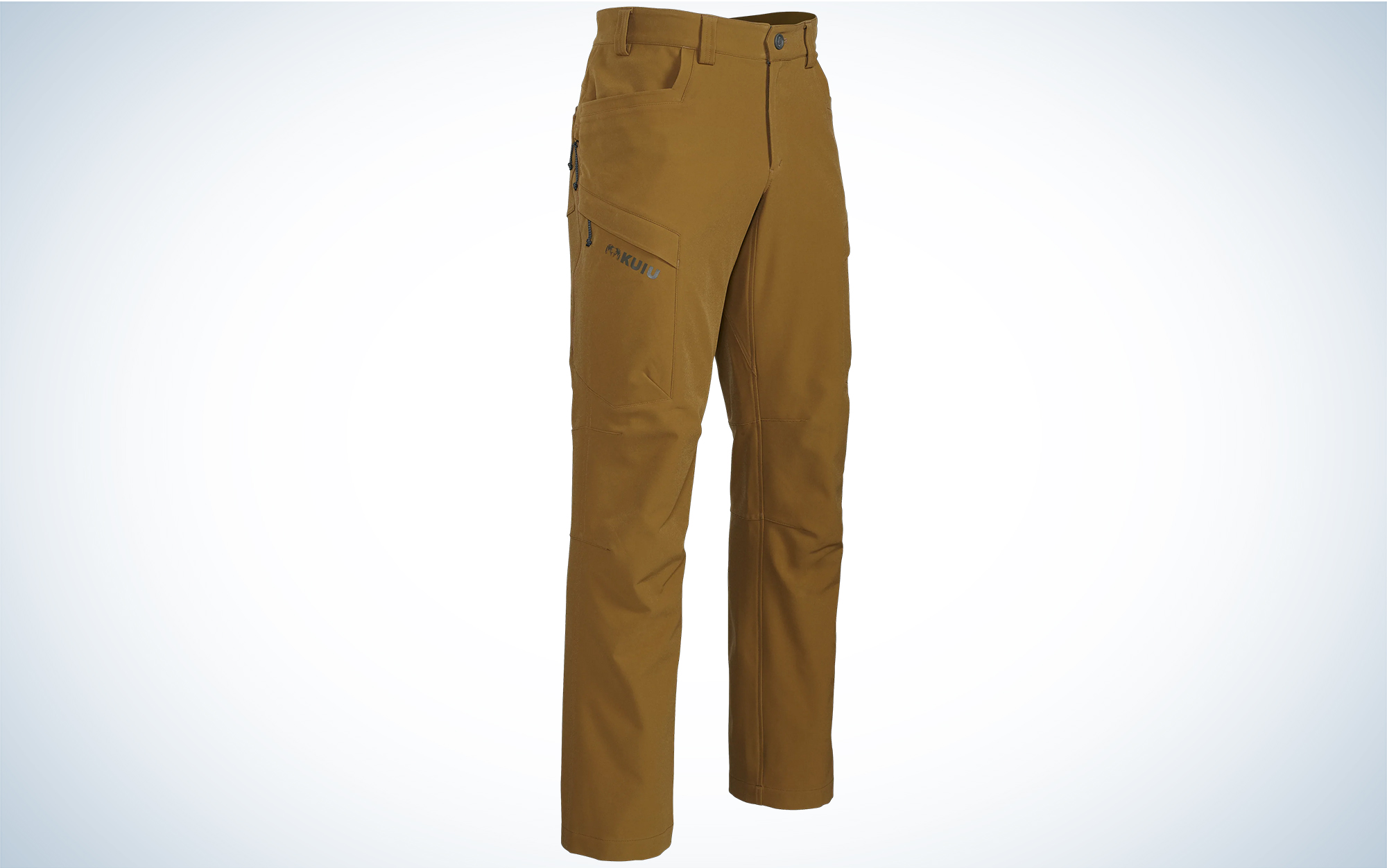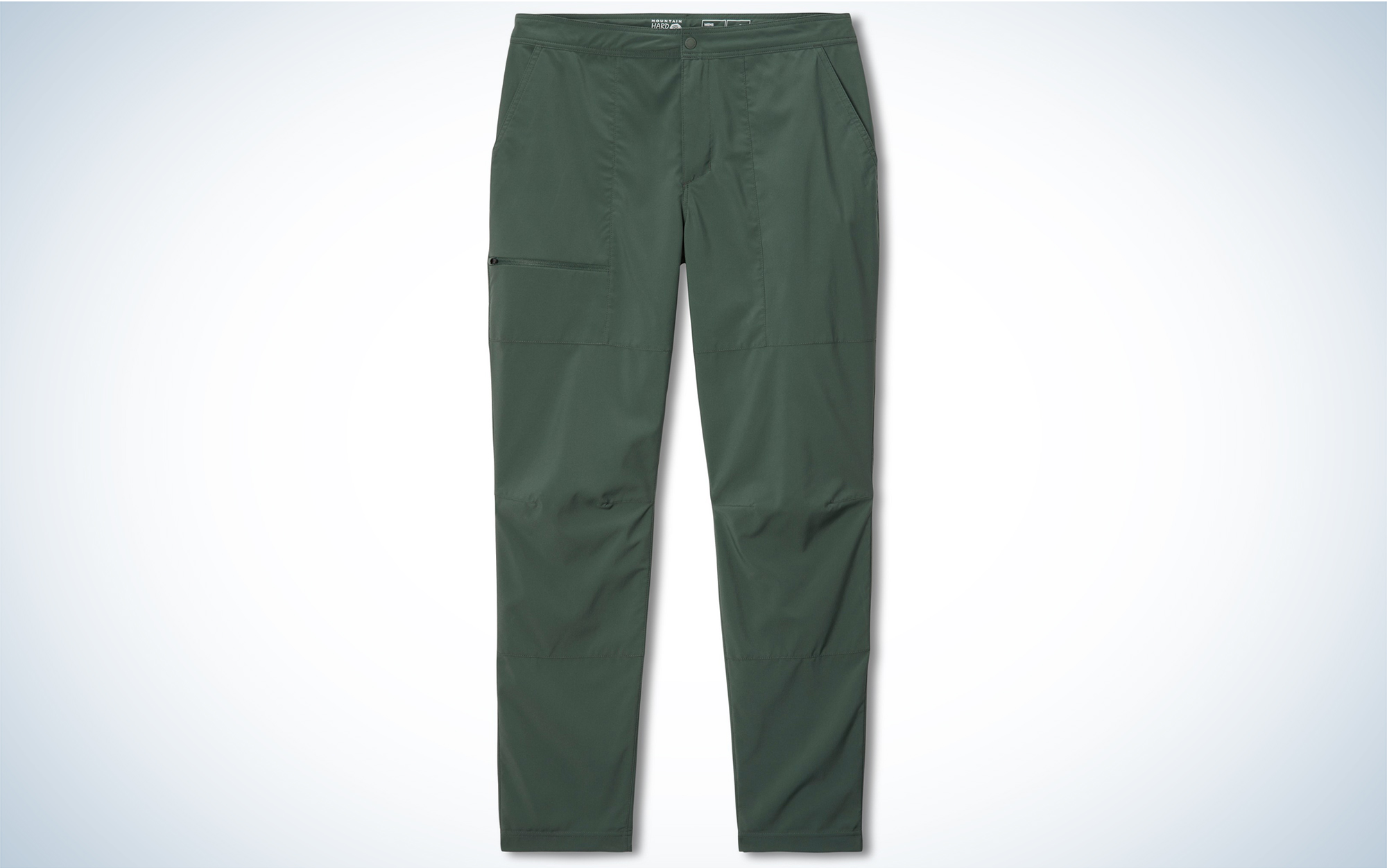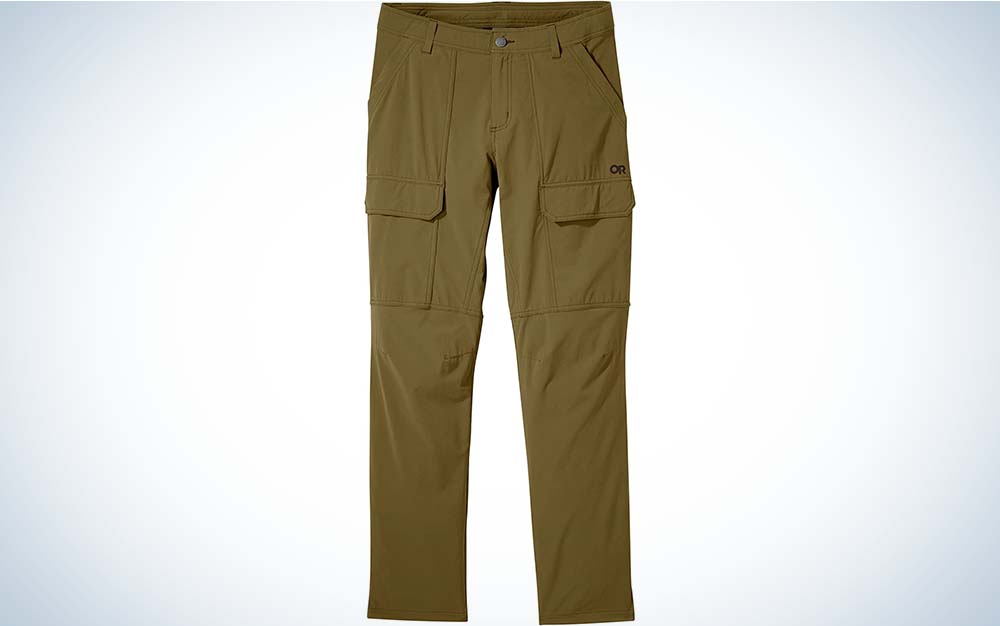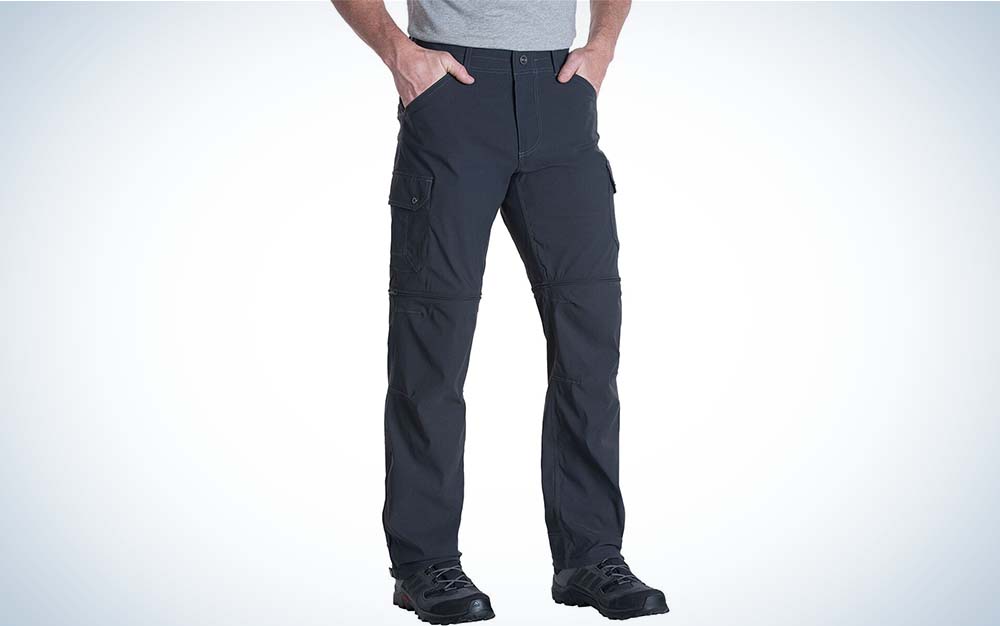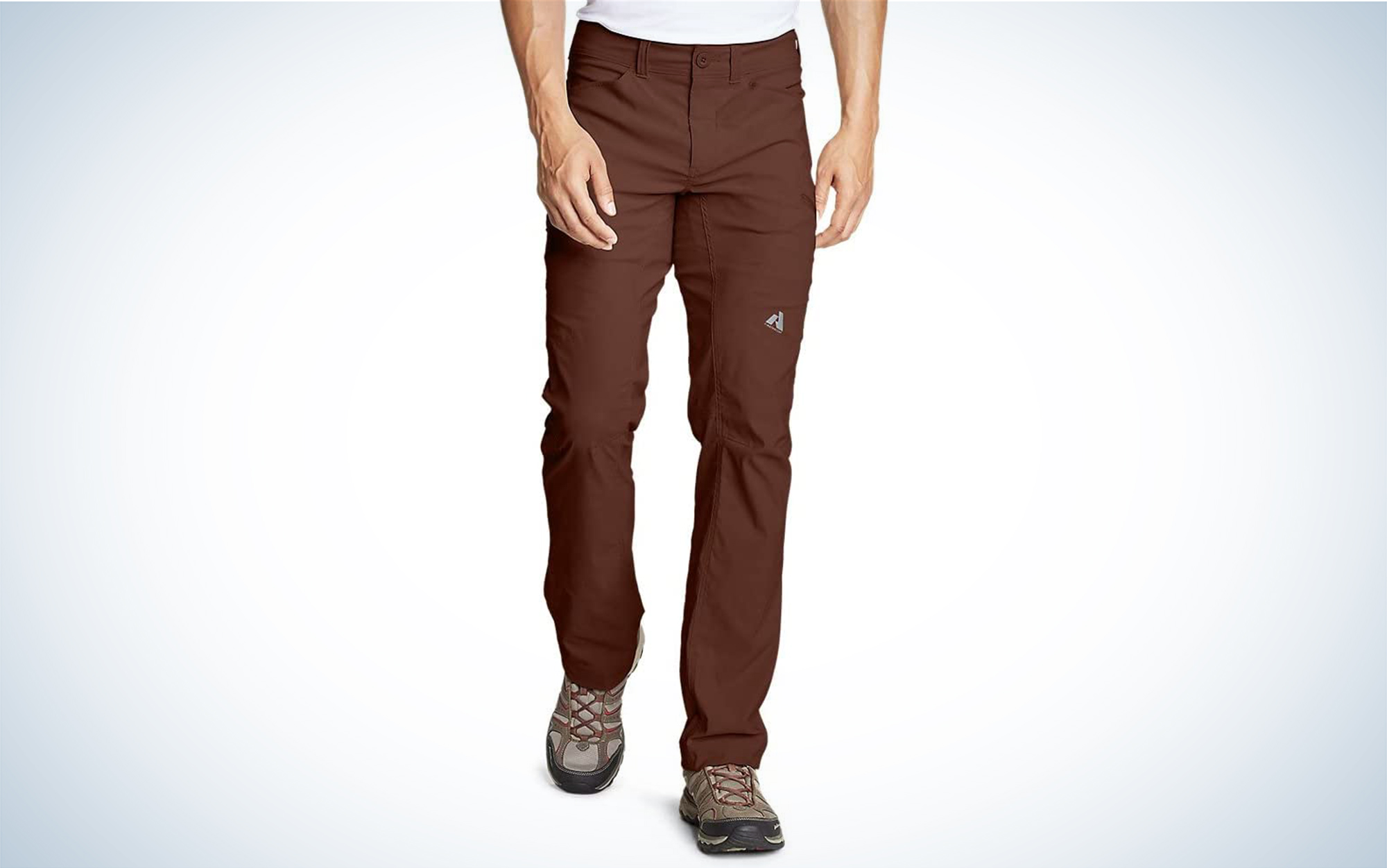We may earn revenue from the products available on this page and participate in affiliate programs. Learn More ›
Updated Jul 24, 2023 5:29 PM
Anyone who has been caught in a rainstorm, had their inseam rip as they sat on a rock during a break, or been swarmed by mosquitoes when the wind died down can appreciate the importance of performance hiking pants. But choosing from so many different models, for everything from casual day hikes to climbing, can be confusing. We’ve picked the best hiking pants out of what’s available today to help narrow the field:
How I Tested the Best Hiking Pants
The best hiking pants evaluated in this roundup—seven different pairs from five different brands—were worn on spring day hikes around the Pacific Northwest with at least 1,000 feet of elevation gain. Two testers, Adam Tycaster and Dave Vanderzee, were used for the men’s pants, both with years of experience hiking and backpacking on trips ranging from a single-day hike of the 17-mile Enchantments trail in Washington State to the Pacific Crest Trail.
Conditions during testing varied from frosty mornings to unexpected showers to early summertime temperatures. Pants were evaluated on comfort, ease of movement, weight, fit, and skin feel. I also separately tested the pants for water absorption (to see how they would perform in heavy rain conditions) and ability to go from trail to post-trail beers. Another consideration was cross-over appeal—whether the pants in the test could be used for multiple activities or whether they would be appropriate for casual wear. Finally, I considered the functionality of each pants’ features (pockets, drawstrings, roll-up buttons).
The Best Hiking Pants: Reviews and Recommendations
Best Overall: Royal Robbins Alpine Mountain Pro Pants
Key Features
- Available in men’s and women’s styles
- Sizing: up to 34.5-inch waist (W); 42-inch waist (M)
- Weight: 11 ounces (W); 13.3 ounces (M)
- Fabric: 88 percent polyester, 12 percent elastane
- Closure: Snap-lock button, women’s version has an adjustable drawcord
Pros
- Comfortable fit in a great cut that is a touch thicker than average
- Durable
- Great pocket coverage
- Made of recycled (88 percent polyester) plastic bottles
Cons
- Lack of inseam sizing makes it hard to find the right length
- No cuff adjustment

The Alpine Mountain Pros do it all. They are rugged enough to tackle brambly trails with just the right amount of flexibility for some scrambling, and after a hard day on the trail they still look good enough to head out for a post-hike beer. The tight knit of the fabric was surprisingly durable given the materials used. But they also feel soft against my skin. I liked that these were a bit thicker on average than the other pants in this review, making them more versatile for shoulder season adventures.
The pockets on the women’s version of these pants were the best of any we tried: the front-hand pockets are deep enough to fit a smartphone, one of the back pockets has a zipper for added security, and there were two deep, thigh pockets that were virtually unnoticeable when empty.
Best for Hot Weather: Free Fly Breeze Pant
Key Features
- Available in men’s and women’s styles
- Sizing: up to 37-inch waist (W); 47-inch waist (M)
- Fabric: 86 percent polyester, 14 percent spandex
- Closure: Pull on with elastic waistband (men’s version has a zipper)
Pros
- Comfortable
- Lightweight
- Cooling
- UPF 50
Cons
- Limited protection from the elements in the event the weather turns
Hot weather can make a mess of even the most breathable material; it’s why you see so many hikers wearing shorts in the desert sections of long trails. But exposing your legs to the sun for hours at a time in intense heat of summer isn’t an option (or even desirable) for all people: fortunately, there is the Breeze series from Free Fly. On overnighters and casual day hikes in bright sunlight, these pants are comfortable in everything from early morning to midday heat.
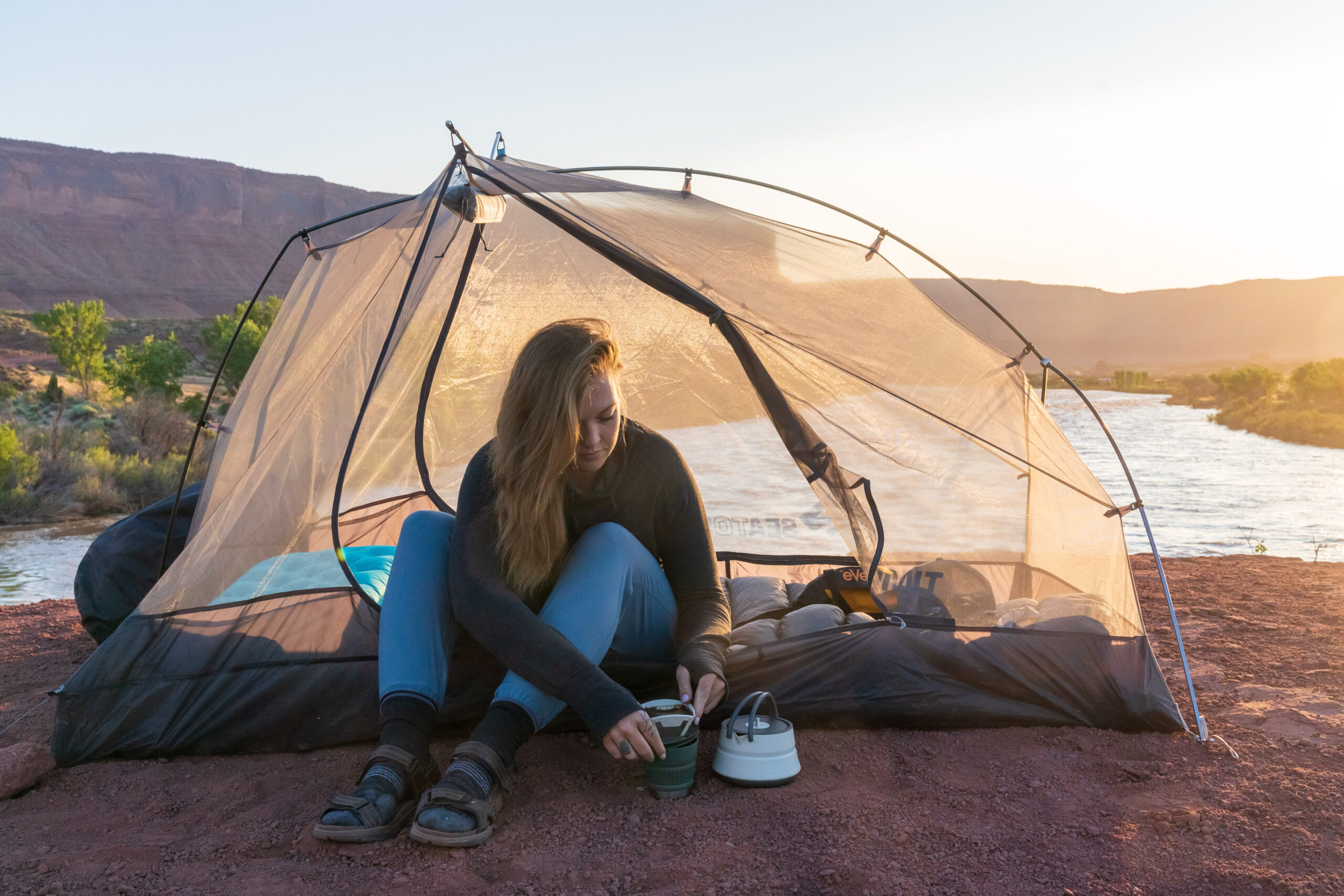
In fact, they often feel cooler than shorts (especially if the wind isn’t delivering as much as you’d like it to) and are very quick drying. They’re rated to UPF 50, which is great for anyone with a sun sensitivity. I’ve also appreciated that they look great. I’m not tempted to switch out of them before heading for post-hike, and have even been known to keep them on throughout the rest of the day into the evening hours. If you’ve been looking for a full-coverage hiking pants option, then this is a great pick that will keep you cool and protected.
Key Features
- Available in women’s styles only
- Sizing: Up to 42.5-inch waist
- Weight: 8 ounces
- Fabric: 94 percent nylon, 6 percent spandex
- Closure: Button closure
Pros
- Lightweight, comfortable fit
- Excellent at repelling water
- Low price
- Comes in plus sizes
Cons
- Unflattering cut
- Wrinkles easily
I’ve worn the REI Savanna Trails everywhere from southwestern canyons to shoulder-season slogs in the Cascade Range and these pants function as well, if not better, than other, more expensive picks. The high nylon content means they are quite durable—after several seasons of use, mine are none the worse for wear—while the stretchy fit of the spandex makes it easy to layer underneath when the weather turns chilly. These pants also repelled water better than much of the competition, making them a top pick for sunrise hikes with brushy sections.
Unlike the other picks for best hiking pants we’ve tested, the Savannas come in both petite sizes and plus sizes, making it more likely that you’ll find something that works for you. The biggest ding is that the cut is quite baggy, and these pants run large compared to other picks on this list (size down if you’re between sizes). They are also more apt to hold onto wrinkles, which might be an annoyance if you are traveling off-grid for an extended period of time.
Key Features
- Available in women’s styles only
- Sizing: Up to 44-inch waist
- Weight: 12.3 ounces
- Fabric: 95 percent recycled nylon; 5 percent elastane
- Closure: Double buttons with drawcord
- The men’s Stretch Zion Pant II is the equivalent to the Halle collection
Pros
- Loose, comfortable fit
- Rollup buttons helped create extra airflow on hot days
- Uses recycled nylon
- Comes in plus sizes
Cons
- Right side-seam zip pocket was difficult to use and may be too small for some smartphones
- Repels water less effectively than other pants in this test
I wore the prAna Halle Pant II on multiple hikes this spring and found them to be the most comfortable in our best hiking pants lineup. This was thanks to a soft knit and a loose cut that was also flattering. These pants also incorporated a roll-up cuff—which I prefer to the men’s style of convertible pants—which worked great when I had worked up a sweat and needed a bit more airflow.
In the water repellency test, these pants absorbed water more readily than the others we tested. These are not the pants we’d pick for a hike through morning dew–soaked brush. That said, their airy fit means that they are unlikely to hold sweat on hot days.
The size and shape of the Halle Pant II’s right side-seam pocket perfectly fit my 5.7 inch x 2.7 inch smartphone—although it may be too small or a tight fit for larger models. The side zip entry helped keep the phone from jostling around while I hiked, but I had to stop to access the phone to prevent it from accidentally falling on the ground.
Like the Savannas, these also come in plus sizes. The equivalent men’s pant is the Stretch Zion Pant II.
Key Features
- Constructed with high stretch polyester fabric
- Wicks and evaporates perspiration
- Four, large, zippered pockets
- Articulated knees and gusseted crotch
- 18.5 ounces
- 28- to 42-inch waist with inseam choices of regular, short, tall
Pros
- Six pockets
- Zippered hip vents
- Thick durable material
- Various colors, including camouflage
- DWR treatment
Cons
- Not meant for warmer temps
- No expandable zippered cuff
- Men’s only
Our tester, an Alaskan bush guide, wore the Kuiu Attack pants over 300 miles through gnarly terrain of thick alders, willows, wet boggy tundra, heavy snow, driving rain, and scree slopes. They went through the wash more than 20 times, and after all the abuse and miles of trailless terrain, these pants still look like the first day he received them. He praised the feel and comfort and that fact that they moved with him with the ideal amount of stretch, especially around the knees and crotch. The six pockets were more than enough to carry keys, a phone, and a wallet with the two back and two thigh pockets still zipping closed. All the zippers have long pulls, allowing you to easily open and close with gloves. When the weather turned to rain and snow, the pants had a long-lasting DWR coating that really pushed the moisture away and dried very quickly. When temps got a bit warmer, our tester loved the 10-inch hip side vent lined with mesh underneath, which was a perfect defense against swarming monster mosquitoes. Both oversized front pockets (not zippered) were also vented for optional air flow. If you are looking for a pant that is best for rough and tough terrain, these were made for those conditions. —Justin La Vigne
Best Lightweight: Mountain Hardwear Trail Sender Pant
Key Features
- Extremely lightweight (6.3 ounces) and breathable
- Very soft material (100 percent polyester)
- UPF 50 fabric for UV rays
- Tapered fit
- Has a style that works on and off trail
Pros
- Material moves with you
- Deep front pockets
- Zippered rear pocket, which fits phone
- No belt loops to interfere with pack waist straps
Cons
- Sizing is bit tight
- No belt loops
- Single snap at waist is small and challenging to snap the pants up
- Only one rear pocket
Our Montana-based tester said the Trail Sender Pants are the lightest at 6.3 ounces and the most breathable model he has ever hiked in. The material has the feel of a high-thread count linen even though it is 100 percent polyester. The tapered cut through the thigh to calf was form-fitting, but not restrictive. The style was fitting for post-hike outings in civilization. Although without a zippered cuff, you cannot take these pants off without first removing your boots. The waist band has a drawstring for ultimate comfort and adjustment on the go, so there wasn’t really a need for an added belt. There are four pockets: two deep open ones on the front hips, one thigh, and a zippered one on the backside that fits a phone. These pants proved to be very stain resistant as our tester coated them in DEET multiple times, but they didn’t stain or wear down at all. Being so ultralight and breathable with UPF protection, they worked well for warmer weather, but also could be paired with a thermal bottom for cooler days. With a $79 regular price tag, these are a great option. And when they go on sale at $39, you definitely can’t go wrong! —Justin La Vigne
Key Features
- Available in men’s sizes only
- Sizing: Up to 42-inch waist
- Weight: 11.25 ounces
- Fabric: 86 percent nylon, 14 percent spandex
- Closure: Button closure with drawcord
Pros
- Comfortable fit that is true to size
- Protected against the cold on windy days
- Rugged enough to withstand the trail
Cons
- Front-facing cargo pockets sometimes got in the way of hiking
- Button snaps were difficult to use on the go
I sent the Ferrosi hiking pants out with a tester on a six-mile out-and-back with 2,400 feet of elevation gain in eastern Washington State. They reported back that, like the other Ferrosi pants, the fabric of these pants felt light, but durable and true to size. Not only did these pants breathe well enough to prevent overheating on the hike up, but the tester reported that “the situation at the top of Umtanum Ridge was quite windy and these pants blocked the wind as effectively as a pair of rain pants.”
Rather than a belt, the Ferrosi has a drawstring at the waist to help users dial in that perfect fit. The one drawback to these pants is that the pockets are more forward-facing than usual, which got in the way on long uphill climbs. Those side pockets also incorporated snap buttons (rather than the zipper found at the back pocket), which felt less secure.
Key Features
- Available in men’s styles only
- Sizing: Up to 42-inch waist
- Weight: 17 ounces
- Fabric: 95 percent nylon; 5 percent spandex
- Closure: Snap button closure
Pros
- High placement of the convertible zippers meant they were never in the way while hiking
- Zips at the cuff allow you to take off the lower legs without taking off your shoes
- Durable, water-resistant fabric
Cons
- No drawcords or attached belt at the waist
The tester for the Renegades was a convertible pants skeptic, at least until he took these out for a few spring day hikes. He reported back that during a hike up Tiger Mountain in Washington State’s Issaquah Alps they were easier to use than expected, mimicking the feel of non-convertible hiking pants when the lower section was attached and zipping off easily when he was ready to convert them. Whereas other convertible pants have a fit that is a hair too relaxed, the Renegades “felt surprisingly lightweight,” and were form-fitting without ever riding up on steep climbs.
While the pocket placement on these has a traditional cargo style, they were slanted more toward the back of the leg, which kept them out of the way. One thing to note about these pants is that they don’t come with a built-in belt or a drawstring cord—something to keep in mind if you plan to size up to accommodate a base layer. The tester also noted that these ran small, so if you are in-between sizes or looking for a more relaxed fit, consider sizing up.
Key Features
- DWR treatment
- 94 percent nylon, 6 percent spandex
- Stylish for on and off the trail
Pros
- Durable with two-way stretch
- Both men’s and women’s sizes
- Wide array of sizes
- Six pockets
- UPF 50+ sun protection
Cons
- No venting abilities
- Velcroed back pockets
- Stitching around front pockets coming undone
These pants can be found on sale for cheaper than the MSRP, making them very affordable. However, the Guide Pro pants don’t act or perform like the inexpensive price. Our tester wore these equally on trail and around town. The comfort, stretch, and feel kept him moving while logging over 200 miles through various terrain. There are six pockets: two open front pockets, two zippered thigh pockets, and two Velcro back pockets. He did note the Velcro back pockets are not practical, as they would open at times with a pack on and sometimes not line up when shut. And it seems after several months of use, the stitching around the pockets is coming undone. The SPF 50+ technology along with the DWR coat added a bonus level of protection. With that being said, he noticed they wetted out quicker than some of the other reviewed pants. The lined waistband does not only add comfort, but has odor controlling properties. Because these pants are made of a lightweight nylon/spandex blend, they can be worn on warmer days, although they do lack venting abilities. —Justin La Vigne
Read Next: The Best Hiking Underwear for Women of 2023
Things to Consider Before Buying Hiking Pants

Materials
Most hiking pants are made from nylon and/or polyester, with spandex or elastane for stretch. Some also incorporate specialty fibers like hemp or Tencel, a type of rayon made from wood fibers. One material that is virtually never seen in the best hiking pants is cotton, due to its tendency to retain moisture.
Bug Protection
In general, pants made from nylon—especially ripstop nylon—will do a better job at keeping bugs (including mosquitoes) away from your skin than polyester. But, if you live in a place where the mosquito is recognized as the official state bird, then you should treat your hiking clothes with permethrin for an additional defense. Some clothing manufacturers now sell hiking pants with permethrin pre-applied which has the added bonus of lasting for additional washings over self application.
Pockets
There can be huge variation between the pockets on men’s and women’s pants, with the men’s pants having adequate to (sometimes) excessive pocket coverage, while some of the women’s pants aren’t cut out to carry much more than some chapstick. In this review, if I’ve commented on pocket coverage, I’ll clarify which version of the pants were tested (the women’s picks in this roundup all have adequate to great pocket coverage), but it’s worth double-checking the manufacturer website to ensure the style you are purchasing has the coverage you need.
FAQs
Q: Do I need hiking pants?
Plenty of people don’t use hiking pants—opting instead for leggings, running shorts, or even jeans—but there are a few reasons why hiking pants are worth the investment. As anyone who lives in tick country knows, long pants are essential for avoiding serious illnesses like Lyme disease. Similarly, while many women hike in leggings, I’ve found that mosquitoes are quite adept at biting through the thin fabric. Jeans, well—we’ve all hiked in jeans at one time or another. But the reality is that in a surprise squall or misstep in a creek could leave your jeans wet and chafing you all the way back to the trailhead. The best hiking pants are a worthwhile investment if you plan to go out on day hikes more than a couple of times per year.
Q: How much do the best hiking pants cost?
Hiking pants can cost anywhere from $50 to $200 or more, with the higher range dominated by more technical hiking pants, suited for off-trail scrambles.
Q: What is the best fabric for hiking pants?
Hiking pants are typically made out of a combination of nylon and/or polyester (for durability) and spandex (for stretch). When looking at pants made from nylon and polyester (which are partially derived from oil and may introduce microplastics), we recommend steering toward ones with a high percentage of recycled fibers, like our best overall pick, the Royal Robbins Alpine Pro Pants.

Why Trust Outdoor Life?
Since 1898, OL has been a leading authority in testing and reviewing hunting gear, fishing tackle, guns and shooting equipment, and much more. We have more than a century-long history of evaluating products, and we’re now bringing that expertise to online reviews. Our editors are experienced outdoorsmen and women, and most importantly, we’re trained journalists. We prioritize field testing and objective data when reviewing products. We conduct interviews with gear manufacturers and engineers as well as outdoor experts so that our readers have an understanding of how and why a product works—or doesn’t.
Advertising does not influence our gear reviews and it never will. While we always focus our coverage on standout products—because we want our readers to be aware of the latest and greatest gear—we also cover the flaws and quirks of any given product.
Final Thoughts
Companies like Outdoor Research, Patagonia, prAna, Columbia, KÜHL, Arc’teryx, Mountain Hardwear, and Fjallraven have spent years perfecting the best hiking pants, and the efforts show. Most hiking pants available for purchase today will function in a wide range of environments, and protect you from sun, bugs, rain, and wind. Hone in on the details that matter most to you (durability? pockets? comfort?) before making a final selection.
Read Next: Best Hiking Backpacks

